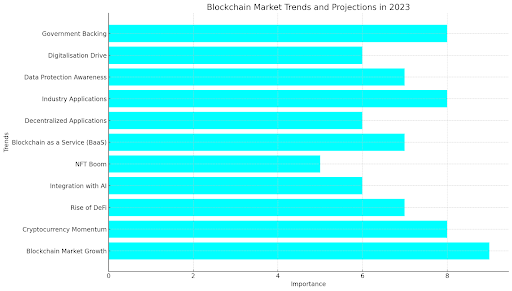
Blockchain, once a nascent technology tethered to the world of cryptocurrency, has now burgeoned into a powerhouse driving technological innovation. Its journey from the digital ledger underpinning Bitcoin to a multifaceted tool for secure, decentralized transactions has been nothing short of remarkable. This article sets the stage to explore blockchain’s vast potential and its predicted trajectory in the coming decade, a period poised to witness its most transformative phase yet.
The Evolution of Blockchain: A Retrospective Analysis
From Bitcoin to a Technological Backbone
Blockchain’s story begins with Bitcoin in 2009, a groundbreaking moment that introduced the world to a decentralized digital currency. However, the technology behind Bitcoin, blockchain, quickly revealed its broader applicability. It became apparent that this was not just a foundation for cryptocurrencies but a revolutionary approach to digital data management.
Transforming Transactions and Security
Blockchain’s impact on digital transactions and data security has been profound. By enabling secure, transparent, and immutable transactions without the need for central intermediaries, blockchain has redefined the concepts of digital trust and security. Its unique properties – decentralization, transparency, and immutability – have made it an ideal solution for a variety of applications beyond digital currencies, ranging from supply chain management to securing personal data.
Blockchain and the Future of Technology: Expert Predictions
Shaping the Next Decade of Innovation
Industry experts universally agree that blockchain’s potential in the next decade is vast and varied. It is poised to redefine a plethora of industries, making operations more efficient, transparent, and secure. The consensus is that blockchain will be a key player in the next era of technological advancement.
Integration with AI, IoT, and More
Predictions for blockchain’s future often include its integration with other emerging technologies. Experts foresee a synergistic relationship between blockchain and Artificial Intelligence (AI), where AI’s analytical power combines with blockchain’s secure data management for enhanced efficiency and reliability. Similarly, the integration of blockchain with the Internet of Things (IoT) is expected to unlock new levels of data integrity and automation in industries like manufacturing, logistics, and urban planning.
Blockchain in Emerging Markets and Industries
Expanding Beyond Traditional Boundaries
Blockchain’s reach is now extending into emerging markets and sectors that traditionally haven’t leveraged advanced technology. This expansion is not just transforming these sectors but also offering new solutions to long-standing challenges.
Diverse Industry Applications
In agriculture, especially within developing countries, blockchain is enhancing supply chain transparency, ensuring fair trade practices, and reducing fraud. The education sector is benefiting from blockchain’s ability to securely and verifiably issue and store academic credentials, streamlining the validation process globally. In healthcare, particularly in underdeveloped regions, blockchain aids in creating secure digital identities and verifying the authenticity of medical supplies, thus improving healthcare access and reliability.
Blockchain Market Trends and Projections in 2023

Bar graph displaying blockchain market trends and projections in 2023, highlighting growth, DeFi, AI integration, and more.
The bar graph vividly illustrates the key trends and projections in the blockchain market for 2023. It highlights the significant areas such as blockchain market growth, the momentum in cryptocurrency adoption, the rise of Decentralized Finance (DeFi), and the burgeoning integration of blockchain with AI.
In-Depth Analysis of Market Dynamics
Market Growth and Cryptocurrency Momentum: The graph indicates a strong surge in the blockchain market and continued expansion of cryptocurrency usage, reflecting the growing mainstream acceptance of these technologies.
DeFi and AI Synergy: The prominence of DeFi and its integration with AI technologies showcases an evolving landscape where finance meets advanced computational capabilities.
NFTs and Blockchain as a Service (BaaS): The NFT boom and the rise of BaaS highlight blockchain’s expanding influence in creative industries and its utility as a service model.
Decentralized Applications and Industry Wide Adoption: The significant role of decentralized applications (DApps) and blockchain’s penetration into diverse industries underlines its adaptability and wide-ranging applications.
Data Protection, Digitalization, and Government Support: The graph also emphasizes the growing awareness of data protection, the drive towards digitalization in various sectors, and increasing government backing, which are crucial for blockchain’s sustained growth and legitimacy.
Preparing Your Business for Blockchain Integration
Gauging Readiness for Blockchain
Businesses considering blockchain integration must first assess their preparedness. This involves evaluating the need for improved data security, more transparent operations, and enhanced transactional efficiency. Understanding blockchain’s potential impact specific to the business context is crucial.
Steps Toward Effective Blockchain Adoption
Educating and training the team about blockchain is the first step, ensuring everyone understands its impact and potential. Next, it’s important to define clear objectives for what the business aims to achieve with blockchain. Selecting the right blockchain platform is crucial and should be aligned with the business’s operational needs. Developing and testing a prototype will provide insights into the practical application and impact. Finally, implementing the technology on a small scale first, then gradually expanding, allows for learning and adjustment along the way.
Navigating Challenges in Adoption
Implementing blockchain can present challenges, including technical complexities and regulatory uncertainties. Additionally, a cultural shift within the organization might be necessary to embrace this new technology. Addressing these challenges requires consulting with experts, keeping up to date with regulatory changes, and fostering a culture of innovation and adaptability.
Blockchain and Global Digital Ethics: Navigating the Future
Ethical Considerations in the Age of Blockchain
As blockchain technology becomes more prevalent, it brings with it a range of ethical considerations that must be addressed. The ability of blockchain to store data permanently raises questions about the right to be forgotten, a key aspect of digital privacy. Furthermore, the decentralized nature of blockchain poses challenges in accountability and governance.
Promoting Digital Ethics and Data Sovereignty
Blockchain holds significant potential in promoting digital ethics and data sovereignty. By enabling secure and transparent data management, blockchain empowers individuals with more control over their personal data. This technology could play a pivotal role in establishing new standards for data privacy and ownership, paving the way for a future where data sovereignty is a fundamental right.
Frequently Asked Questions (FAQs)
How Will Blockchain Technology Evolve in the Next Decade?
Over the next decade, blockchain technology is expected to undergo significant advancements, particularly in scalability, interoperability, and integration with other technologies like AI and IoT. These developments will enhance its applicability in various sectors, making it more efficient and user-friendly.
Can Blockchain Technology Really Improve Data Privacy and Security?
Yes, blockchain has the potential to significantly improve data privacy and security. Its decentralized nature prevents data from being controlled by a single entity, while its cryptographic features ensure the security of the data stored on the network. These characteristics make it an excellent tool for enhancing data privacy and security in various applications.
What Are the Environmental Impacts of Blockchain Technology?
The environmental impact of blockchain technology primarily concerns energy consumption, which is high in systems that use proof-of-work (PoW) consensus mechanisms, like Bitcoin. However, newer blockchain technologies are exploring more energy-efficient consensus mechanisms like proof-of-stake (PoS), which have a much lower environmental impact.
How Can Blockchain Technology Be Applied Beyond Cryptocurrencies?
Beyond cryptocurrencies, blockchain has a myriad of applications. It’s being used in supply chain management for transparency and traceability, in healthcare for secure patient data management, in real estate for streamlined property transactions, and in digital identity verification, among others. Its versatility makes it applicable in almost any field that requires secure and transparent record-keeping.
In conclusion
As we look towards the future, it’s clear that blockchain technology is not just a transient trend but a pivotal force in the evolving technological landscape. Its potential to revolutionize industries, uphold digital ethics, and empower data sovereignty positions blockchain as a key player in shaping our digital future. The next decade promises unprecedented advancements in blockchain technology, heralding a new era of digital transformation driven by security, transparency, and innovation.
Eric Dalius is The Executive Chairman of MuzicSwipe, a music and content discovery platform designed to maximize artist discovery and optimize fan relationships. Alongside this, Eric hosts the weekly podcast “FULLSPEED,” discussing entrepreneurship with industry leaders. Eric also founded the “Eric Dalius Foundation” to award four scholarships to deserving US students. Follow Eric’s activities on Twitter, YouTube, Facebook, LinkedIn, Instagram, and Entrepreneur.com.
